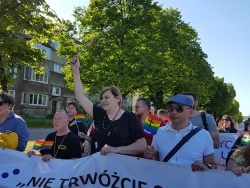GALE and LGBT Christians want cooperation with religious schools

27 May 2017 - GALE attended the annual conference of the European Forum of LGBT Christians in Gdansk (Poland) and facilitated a workshop on cooperation with religious schools. The differences in Europe turned out to great to agree on a joint strategy or project. Still, the workshop was one further step in creating European cooperation.
Great differences between European states
The workshop focused on discussing experiences in Christian schools, challenges to get into dialogue with them and good practices with cooperation between LGBT Christian groups and schools. It immediately became clear that this was one of the first times this topic was discussed on an international level and that the exchange of information was quite new. It also became clear there are big differences within Europe.
Participants from Poland and Russia expressed concern for the situation of LGBT students and teachers. Their position was weak to begin with, but is increasingly threatened by ultra-conservative forces. The Christian Forum conference was closed with a local LGBT Pride, but there were some tensions because a large number of counter demonstrations of radical right-wing groups had been announced. These ultra-right demonstrations are part of a deteriorating Polish political situation. The current government has silenced the parliament and replaced all the judges by right-wing political allies. Poland is rapidly descending into a right-wing dictatorship which tacitly supports fascist groups. Happily, the LGBT Pride happened without serious incidents due to good police protection (photo: Ewa Holuszko, a fighter for the Polish trade union Solidarnosc, behind the banner of the religious LGBT group in Gdansk. Ewa was ignored and rejected in the union after her transition.)
In contrast to the stories of these threatening fascist situations in middle and Eastern Europe, the participants of the workshop heard examples of very supportive policies and interventions in the U.K. and the Netherlands. In the U.K., the government has initiated a policy which makes in mandatory to support LGBT students. In the Netherlands, the central education objectives make it mandatory to teach about sexual diversity in primary and secondary schools. In both countries, the governments supports NGOs to approach religious schools and to work with them to improve their quality of education.
The perspective for European cooperation
The workshop was originally meant to explore the potential for European cooperation and more specifically to find partners for a European development project. The intended project would focus on experimenting with different ways for LGBT Christian groups to cooperate with Christian schools. An attempt to develop such a project proposal was launched in the past year, but it failed. In middle Europe, contacts with schools are too limited or forbidden and Christian groups do not feel confident yet to engage in a European project.
The participants did not have time to discuss European cooperation. However, during the conference a successful Polish campaign was discussed. This campaign intended to initiate a dialogue with churches. It featured images of hands shaking, one hand with an armband with a cross and one with a rainbow band. The campaign created a lot of discussion in Poland. Some progressive Catholics were won over to engage in dialogue. Although the Polish bishops rejected the campaign, it was considered a success in at least starting some dialogue.
The next step of GALE will be to discuss the possibility of cooperation between some middle European Christian groups in cooperation with secular LGBT groups. In this discussion, there will also be attention to how European cooperation could not only focus on working with religious schools, but also to engage on the initial level to start the dialogue with Christian schools.
Peter Dankmeijer


